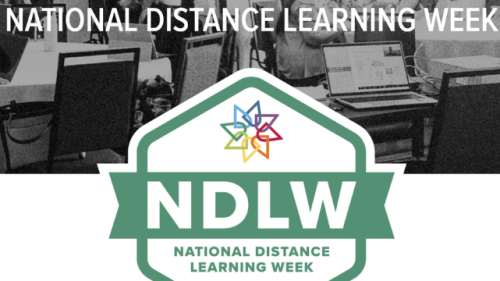Sitting on my deck on a sunny day as summer begins to fade into fall, I can see a single thread of a web spanning the large opening of the deck stairs from rail post to rail post. I had sat down to write a blog post about National Online Learning Day but instead found myself contemplating the amount of ambition a spider must have to decide to build a 10-foot-wide web. Just as I was about to get back to work, I noticed that this feat was being undertaken by a minuscule spider who was now working on another thread halfway across this immense expanse. I watched for a while, torn between being impressed that such a tiny arachnid could accomplish this amazing feat and feeling sad for this little guy because somebody was clearly going to walk through this web before the end of the day.
However, as I continued to watch his futile efforts, I felt a slight annoyance with his lack of forethought. Why on earth would he need a 10' web? What was he hoping to catch - an antelope? How much web could he possibly spin out of his tiny body? Could he manage even another full strand across the empty expanse? Was his hunger so massive that it blinded him to reality? As I watched and pondered, a gust of wind detached the lone silk thread from one of the posts, and the spider hanging from a second strand disappeared in an instant. I looked for him. I checked to see if his life’s work really was gone. It was. I couldn’t find any trace of the little guy. I don’t know much about spiders, and maybe this technique is part of some super spider strategy, but if so, it is beyond my comprehension. I just couldn’t think of any way that this would be an effective engineering strategy.
I think he was a good spider, at least that was my impression while watching him work, but can’t help but wonder about his motivation and how he’d respond to such an epic failure. Maybe he was a spider who just had to have the biggest web - just had to make the other spiders envious. I mean, if his driving ambition was so superficially motivated, it’s hard to feel that bad for him. But maybe I’m completely wrong about his motivation. He was a really, really, tiny spider, and who knows what attitudes spiders have about such things? Maybe he was perfectly content building insect-catching webs of small but effective size, and then some macho spiders came along to belittle his efforts right in front of his tiny and very sweet spider girlfriend, completely ruining his carefully prepared gnat and mosquito bouillabaisse dinner. It would be hard to fault his instinctive reaction to be bold.
But no, I’m not completely sympathetic to that reaction. Bullies and idiots are inevitable no matter what species. (I don’t know that to be a fact, just an assumption.) How we react to them, though, well, that is what makes us who we are. Everybody, including spiders (again, just an assumption), want to react forcefully in some grand, dramatic fashion against the naysayers, but if motivated by envy or defensiveness, how well does that usually turn out? Motivation must come from within. Even spiders should have some awareness of this.
No matter how sympathetic I feel to the plight of this industrious spider, I can’t help but feel that I want to hold him to a least some level of responsibility for his own actions. That first thread across a ten-foot expanse was certainly impressive. This spider had some amazing abilities, was willing to take risks, and had some serious determination. My issue with him is that with just a little bit of strategic and design thinking, he could be completing an amazing and useful web rather than being completely blown off course and having to start over from scratch.
There is always a dilemma between adopting an optimistic, just do it attitude and having a realistic assessment of your own abilities and probabilities of success. When we are young, we take chances, lots of them. We have no idea what we are capable of, and so we just do things. Fortunately, we have parents, teachers, or somebody who hopefully has more sense than we do to help us out of the inevitable jams we get into. Along the way, however, we develop skills and knowledge of things we can do successfully.
As adults, many of us have low enough self-esteem that, based on our own views of ourselves, we’d do nothing, or at least very little, except rely on the skills and knowledge we developed when we were kids because those are the endeavors in which we know we can be successful. That is clearly a bad strategy for adulting. Personal growth is essential for happiness (again, I don’t know that for a fact, but from personal observation, believe it to be true), and certainly, we need to learn and gain more skills as adults than we had as children. To do that, though, we must take risks; we need to stretch beyond the constraints of the sureties we already know. We must be willing to fail and then, most importantly, try again.
In my mind, the effort of that little spider makes a good analogy for how we navigate our educational growth in our adult years. Stretching ourselves and pushing our boundaries is important to our success. Being an adult also means we have many responsibilities and perhaps must be more strategic in the risks we take. Pushing ourselves to grow intellectually takes time and effort, but the rewards can be extraordinary. However, fear of failure is very real.
Higher education has traditionally been reserved for those able to immerse themselves in their education. Completing the undergraduate degree was reserved for those who could afford to dedicate four years to the pursuit right after high school. For those of us who, for whatever reason, missed that window of opportunity, returning and finishing our undergraduate was possible, but the barriers were much like the experience of the tiny spider trying to bridge a ten-foot gap. Completing a graduate degree or any level of certification often meant that it was necessary to take time away from a nascent career to pursue a degree full-time and perhaps even to relocate physically.
However, the advent of online education has changed the risk/reward calculation somewhat. Although there are still risks incurred in any undertaking as large as pursuing a degree, the risk is mitigated by not requiring learners to uproot their life to immerse themselves full-time to advance their educational goals. As our world continues to change more rapidly, continued education becomes more necessary throughout our life. Finding a work/life/school balance is critical for the success of individuals and for society. Online education helps people find that balance to facilitate continued intellectual growth.
As I suggested, the tiny spider might have done, stepping back, allowing oneself to dream of what might be possible, while also developing expectations and goals that acknowledge the realities of life at that moment can lead to a more successful and realistic strategy for fulfilling life goals. Part-time, online degrees offer the flexibility for adults to take a rational but still committed and rewarding approach to create a better and richer life through learning. Even learners attending a university in-person, full-time, often benefit from the flexibility offered through online learning. Online learning can be part of a strategy of cultivating our ambitions but in a manageable fashion.
My hope for my little spider friend is that by being blown off course, he’s found a more reasonable environment for creating his beautiful web. I also wish him well because there are more flies about this year than I’d like to see. His success will certainly also benefit me. I hope he’s still taking some risks but has learned from his experience to think about his goals and spend some time planning his strategy for success. Bigger is not always better. Getting the most accolades is often quite irrelevant for success in life. Doing the best you can do, taking chances based on serious considerations of who you are and want you to want to accomplish, well, that can result in one beautiful, interconnected web of good experiences






